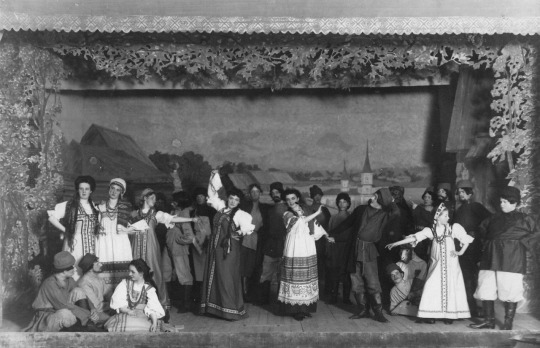#Russian composer
Explore tagged Tumblr posts
Text
youtube
Alexander Tcherepnin (1899-1977) - 10 Études, Op.18 (1915-1920)
I. Allegretto 00:07 II. Rubato 02:14 III. Marziale 03:57 IV. Andantino 05:48 V. Vivace 07:49 VI. Moderato 09:46 VII. Allegretto con moto 11:16 VIII. Vivace 12:48 IX. Maestoso 13:25 X. Lento 15:55
Giorgio Koukl, piano
8 notes
·
View notes
Text

Italian opera singer Nini Giani as Lubava in Rimskiy-Korsakov's opera "Sadko",Italy (XX century)
#Italia#Italy#vintage#photography#Nini Giani#русская опера#Russian opera#opera#Садко#Sadko#русский композитор#russian composer#composer#Николай Римский-Корсаков#Nikolay Rimskiy-Korsakov#Italian#русская культура#russian culture#culture#Europe#italian opera#history#beauty#black and white#european#vintage photography#20th century
22 notes
·
View notes
Text

No matter what you say,
I love him anyway...
Music: P. I. Tchaikovsky - Swan Lake Ballet op.20 (Dance of the Swans)
#picsart#collage art#my edit#classical music#tchaikovsky#russian composer#swan lake#piano aesthetic#great musicians#коллаж#творю и вытворяю
16 notes
·
View notes
Text

Boris Tchaikovsky
#history#vintage#photography#musician#music#portrait#black and white photography#russia#russian classical music#russian#boris tchaikovsky#russian composers#russian composer#composer#modern classical#modern#modernism#modern music#classical music history#musicology#classical music#20th century history#20th century#twentieth centrury#twentieth century history
7 notes
·
View notes
Text
why would you say i love you when rachmaninoff was the pallbearer at scriabin's funeral in 1915 and then, 28 years later when his death was coming in 1943, he wished to be buried in novodevichy cementary, besides scriabin.
#and sadly his wish was never complied because of the us citizenship#serbin#sergei rachmaninoff#alexander scriabin#classical composer#classical music rpf#russian composer#idk theyd fit an angsty fic
5 notes
·
View notes
Text
youtube
It's a great pleasure to share the delightful performance by Le Off (musiciens de l'Orchestre de Paris) of Stravinsky's Pastorale, a composition so different from his ballet and orchestral works.
#Stravinsky#Pastorale#Le Off (musiciens de l'Orchestre de Paris)#Russian Composer#The Firebird#Petrushk#The Rite of Spring#Youtube
9 notes
·
View notes
Text
Born in Petrograd, Ustvolskaya studied from 1937 to 1939 at the college attached to the Leningrad Conservatory (later renamed the Rimsky-Korsakov Conservatory). From 1947 till 1977 she taught composition at this college. In 1939 she entered Dmitri Shostakovich's composition class at the Conservatory as the only female student in his class. Her composition teacher said of her:
"I am convinced that the music of G. I. Ustvolskaya will achieve world fame, and be valued by all who hold truth to be the essential element of music."[1]
Shostakovich sent some of his own as yet unfinished works to Ustvolskaya, attaching great value to her comments. Some of these pieces contain quotations from his pupil's compositions; for example, he employed the second theme of the Finale of her clarinet trio throughout the Fifth String Quartet and in the Michelangelo Suite (no. 9).
Ustvolskaya was a pupil of Shostakovich from 1939 to 1941 and from 1947 to 1948, but her works from the 1950s onwards retain little influence of his style. Until 1961 none of her true works were performed other than patriotic pieces written for official consumption. The middle of the 1960s witnessed greater tolerance for modernist music, and interest in Ustvolskaya began to grow – the Leningrad Union of Composers organized in the 1970s evenings of her music, which received high praise from listeners and critics. Widespread recognition came after her music was performed in several concerts of the 1989 Holland Festival.
2 notes
·
View notes
Text
#collectible#ebay#tsarist russia#100 years or older#photo postcard#Russian COMPOSER#TCHAIKOVSKY Pyotr
0 notes
Text

Lev Knipper [Lev Konstantinovich Knipper] (3 December [O.S. 21 November] 1898 – 30 July 1974) was a Soviet and Russian composer and OGPU/NKVD agent.
0 notes
Video
youtube
Sergei Prokofiev: Visions Fugitive Nos 1, 3 & 4
0 notes
Text
youtube
Nikolai Myaskovsky (1881-1950) - Symphony No. 27 in C Minor, Op. 85: I. Adagio - Allegro animato ·
Evgeny Svetlanov, USSR State Symphony Orchestra
7 notes
·
View notes
Text

Scene from an unknown opera in the Nikolay Andreyevich Rimskiy-Korsakov Conservatory Hall,Saint Petersburg (1910s)
#Россия#Russia#vintage#photography#Санкт-Петербург#Saint Petersburg#Europe#русское искусство#russian art#art#Николай Римский-Корсаков#Nikolay Rimskiy-Korsakov#русский композитор#russian composer#composer#european#русская культура#russian culture#culture#history#russian#black and white#vintage photography#1910s#20th century
22 notes
·
View notes
Text

Dmitry Shostakovich on the Red Arrow train.
Photo by Tarasevich, 1966
102 notes
·
View notes
Text

Nickie Zimov
#nickie zimov#b. 1993 russian#self taught#contemporary mixed-media artist#composer#original expressionism
35 notes
·
View notes
Text
oh a french horn is an unexpected inclusion in a musical with a four-part orchestra, but it's definitely a reference to Peter and the Wolf, a Prokofiev symphony where every animal character has not only their own motif but a specific instrument they're associated with. the wolf is a french horn. if you stretch a bit, you can say there are three houses plus a wolf just as there are three instruments plus a horn
#and we know dave loves his russian 20th century composers#three houses musical#malloysicals#dave malloy#analyzing the themes
36 notes
·
View notes
Audio
13 Preludes, Op.32 : No. 11 In B-Major
Composition Year : 1910
By Composer Sergei Rachmaninoff
Ruth Laredo, Pianist
#13 preludes#no.11 in b major#sergei rachmaninoff#rachmaninov#russian composers#20th century period#classical music#audio#audio post
26 notes
·
View notes